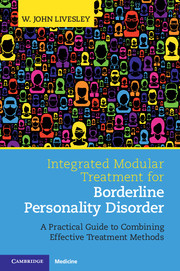 Integrated Modular Treatment for Borderline Personality Disorder
Integrated Modular Treatment for Borderline Personality Disorder Book contents
- Frontmatter
- Dedication
- Contents
- Preface
- Section 1 Introduction and Framework for Understanding Borderline Personality Disorder
- Section 2 Assessment and Treatment Planning
- Section 3 General Treatment Modules
- Section 4 Safety, Containment, and Engagement: The Initial Phase of Treatment
- Section 5 Improving Emotional Regulation and Modulation
- Section 6 Exploration and Change: Treating Interpersonal Problems
- Introduction
- 18 Principles for Treating Maladaptive Schemas and Interpersonal Patterns
- 19 Treating Submissiveness
- 20 Working with the Core Interpersonal Conflict
- Section 7 Constructing an Adaptive Sense of Self
- Section 8 Retrospect and Prospect
- References
- Index
20 - Working with the Core Interpersonal Conflict
from Section 6 - Exploration and Change: Treating Interpersonal Problems
Published online by Cambridge University Press: 16 February 2017
- Frontmatter
- Dedication
- Contents
- Preface
- Section 1 Introduction and Framework for Understanding Borderline Personality Disorder
- Section 2 Assessment and Treatment Planning
- Section 3 General Treatment Modules
- Section 4 Safety, Containment, and Engagement: The Initial Phase of Treatment
- Section 5 Improving Emotional Regulation and Modulation
- Section 6 Exploration and Change: Treating Interpersonal Problems
- Introduction
- 18 Principles for Treating Maladaptive Schemas and Interpersonal Patterns
- 19 Treating Submissiveness
- 20 Working with the Core Interpersonal Conflict
- Section 7 Constructing an Adaptive Sense of Self
- Section 8 Retrospect and Prospect
- References
- Index
Summary
This chapter discusses the management of the core conflict between need for care, love, attention, and proximity with attachment figures and significant others and fear of rejection both throughout therapy and during this phase of treatment. The conflict arises when psychosocial adversity creates an approach-avoidance conflict in which the natural tendency to seek out attachment figures when threatened also activates fear of approaching these individuals because of the harm that they previously caused. To simplify this discussion, the management of each pole of the conflict will be discussed separately followed by some general comments on treating the overall conflict.
Neediness and Dependency
The intense dependency associated with borderline personality disorder (BPD) usually arises from deprivation and abuse. However, dependency can also result from overprotective caregiving. Although the two forms of dependency have some common features, they have different treatment implications.
Patterns of Dependency
Overprotectiveness fosters dependency by hindering the development of independence, self-efficacy, and confidence in one's ability to interact effectively with the world, leading to a constant need for guidance and reassurance. This kind of dependency is usually less severe and presents fewer management problems than dependency arising from deprivation, because with overprotective caregiving the child's early needs for care are usually met. Hence the therapeutic task is to foster independence and self-efficacy. Although this pattern can occur with BPD (Allison, a patient who will be discussed in later chapters, showed some of these features), it is less common than dependency arising from deprivation. The latter combines a need for support and reassurance with intense neediness. This presents more management problems because gratification of these needs tends to stimulate them rather than satisfy them, leading to increased demands for care and decreased coping. This outcome is seen in patients with severe BPD who deteriorate as a result of contact with the mental health system. It is as if the care they received, especially if in-patient care is involved, increases these needs, leading to further regression. This eventuality is reduced by adopting a therapeutic stance that provides support while also promoting change and self-efficacy. Nevertheless, some clinicians become overly concerned about patients becoming dependent and regressing in therapy, leading them to fail to provide the support needed to build the alliance.
- Type
- Chapter
- Information
- Integrated Modular Treatment for Borderline Personality DisorderA Practical Guide to Combining Effective Treatment Methods, pp. 213 - 228Publisher: Cambridge University PressPrint publication year: 2017


